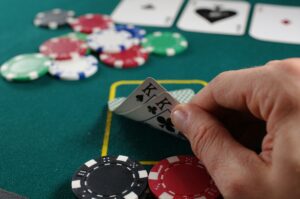Mastering Poker Psychology: Building the Mindset of a Pro


Poker is not just about math, cards, and luck—it is also about psychology. The difference between a skilled amateur and a seasoned professional often lies in mindset. Developing mental toughness can help players remain composed under pressure, make informed decisions, and adapt to changing circumstances. Therefore, understanding poker psychology is essential for those aiming to play the game at a professional level.
The Power of Emotional Control
In poker, emotions can cloud judgment quickly, leading to impulsive plays and costly mistakes. Professionals train themselves to recognize tilt—the frustration or anger that comes from losing a big hand—and then manage it effectively. By staying calm, they can maintain focus and continue to make decisions based on logic rather than emotion. Moreover, emotional stability enables players to read opponents more clearly, as their own reactions do not interfere.
Furthermore, emotional control builds resilience. Poker is a game of variance, which means even the best players lose sometimes. However, professionals accept these losses as part of the process. Instead of dwelling on defeat, they use setbacks as learning opportunities, which strengthens their mindset over time. As a result, they keep their emotions in check and focus on long-term success rather than short-term frustrations.
Confidence and Self-Belief
Confidence is another cornerstone of poker psychology. Players who trust their decisions are less likely to second-guess themselves, which helps them project strength at the table. Confidence also discourages opponents from exploiting hesitation, as uncertainty is easily detectable. Thus, cultivating self-belief is critical to maintaining a competitive edge.
Additionally, true confidence in poker is not blind arrogance—it is rooted in preparation. Professionals study strategy, review past hands, and practice regularly. This consistent effort reinforces their self-belief, making them more comfortable taking calculated risks. Consequently, they approach the game with assurance, even when the stakes are high.
Focus and Discipline
Poker requires unwavering concentration. With so many variables—bet sizing, opponent behavior, table dynamics—losing focus for even a moment can cost a hand. Professionals build discipline by training themselves to stay present, filtering out distractions, and resisting the urge to play too loosely. By focusing on every detail, they sharpen their ability to predict patterns and anticipate moves.
Equally important, discipline prevents reckless decision-making. It encourages players to stick to their strategy instead of chasing losses or making desperate plays. This approach ensures that choices align with logic rather than temporary emotions. In turn, disciplined players protect their bankrolls and sustain long-term profitability.
Adapting to Pressure
Poker tournaments and cash games often create intense pressure, especially when large sums of money are at stake. Mental toughness enables players to remain calm in these high-stakes environments. They accept the uncertainty of each hand and focus instead on making the best possible decision with the information available to them. This adaptability under pressure separates casual players from professionals.
Moreover, adaptability extends to handling different playing styles. Some opponents are aggressive, while others are cautious. A tough-minded player can adjust strategies without losing composure, ensuring they are not easily manipulated. By viewing pressure as an opportunity rather than a threat, professionals thrive in situations where others crumble.
Building a Growth Mindset
Professional players recognize that mastery comes through continuous growth. A growth mindset fuels their willingness to learn from mistakes, refine strategies, and remain open to feedback. They see setbacks not as failures but as stepping stones toward improvement. This outlook keeps them motivated, even when results are not immediately favorable.
Additionally, adopting a growth mindset enables players to approach challenges with a more open and receptive attitude. Instead of avoiding challenging games, they seek them out, knowing these experiences accelerate development. Over time, this consistent learning shapes them into more resilient and versatile competitors. With this mindset, they do not just play poker—they evolve with it.
Poker is as much a mental game as it is a strategic one. Developing emotional control, confidence, focus, adaptability, and a growth mindset equips players with the tools needed to compete at the highest levels. Transitioning from amateur to professional demands more than skill with cards—it requires building the mental toughness to handle pressure and uncertainty. Ultimately, the strongest players win not just because they know the odds, but because they master their minds.

